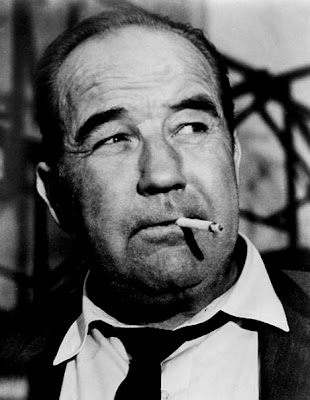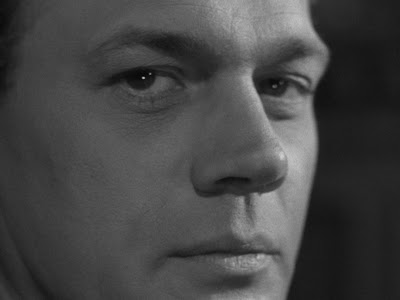Neville Brand (1920-1992)
 |
| A beautiful mug. |
“With this kisser, I knew early in the game I wasn’t going to make the world forget Clark Gable.”
.jpg) |
| Rumpling Edmond O'Brien in D.O.A. (1950). |
[On playing villains] “I don’t go in thinking he’s a villain. The audience might, but the villain doesn’t think he’s a villain. Even a killer condones what he’s done. I just create this human being under the circumstances that are given. I don’t think he’s a villain. Everybody just condones his own actions.”
.jpeg) |
| Abetting Lee Van Cleef in Kansas City Confidential (1952). |
[After Don Siegel awarded him the lead in Riot in Cell Block 11] “There’s only one way to thank you. I’m going to play Dunn — shit, I am Dunn.” (From A Siegel Film)
.jpg) |
| Giving Whit Bissell a close shave in Riot in Cell Block 11 (1954). |
“Riot in Cell Block 11 is based on truth. I had the role analogous to Earl Ward, who was responsible for the riots in a Michigan prison last year. This convict was admired by his fellow inmates. Our producer, Walter Wanger, took us to Folsom Prison, and we encountered much trouble and lack of cooperation from the cons. But then they realized that we were trying to represent some of the good things that came out of the riots, and then they backed us all the way. I found that homicidal psychopaths run the prisons, and it is absolutely necessary for segregation into types. A majority of the cons are not criminals in the true sense of the word, and hence they should not be put into association with habitual criminals. I studied many books on crime to be able to play the part convincingly, but when we arrived at Folsom I realized that they were human beings, so I just acted as Neville Brand.” (1955 interview with Jerry Pam)
.jpeg) |
| Playing games with Inger Stevens in Cry Terror (1958). |
“I look at the pretty boy actor as a mass-produced item as opposed to the ugly one as a special order. Take me, for instance. Somebody at a party told me once that my face looked as though the entire Russian army had conducted a three-day battle on it in mountain-climbing boots.” (Brand as guest columnist in the June 9, 1966 Citizen-News)
.jpg) |
| Channeling Al Capone in The Scarface Mob (1959). |
“Guys like me will be around this town a lot longer than the pretty boys because we are — like the specialty items in the auto business — special models, unique and one of a kind. Nobody forgets our faces once they’ve had a good look at ’em. We may produce nightmares instead of pleasant dreams, but we aren’t forgotten.” (Brand as guest columnist in the June 9, 1966 Citizen-News)
.jpg) |
| Creeping out Anjanette Comer in Death Stalk (1975). |
[On being wounded during WWII] “I knew I was dying. It was a lovely feeling, like being half-loaded.” (1966 TV Guide interview with Arnold Hano)
 |
| Finally a good guy: Reese Bennett on Laredo. |
[On his drinking] “The booze became medicine, man. Suddenly you’re not drinking to get drunk anymore. And the only way you can hit the morning — I used to call that just getting even — is to grab that jug. I’d have a pint of whiskey in the morning just to make a phone call.” (1975 Los Angeles Times interview)
My favorite Neville Brand films: D.O.A. (1950), Where the Sidewalk Ends (1950), Kiss Tomorrow Goodbye (1950), The Mob (1951), Kansas City Confidential (1952), Stalag 17 (1953), Riot in Cell Block 11 (1954), Cry Terror (1958), The Scarface Mob (1959), The George Raft Story (1961), Birdman of Alcatraz (1962)







.jpeg)

.jpg)
.jpeg)

.jpeg)









+With+Burt+Lancaster+in+I+Walk+Alone+(1948).jpg)
+Technicolor+madness+in+Desert+Fury+(1948).jpeg)
+With+Bogart+in+Dead+Reckoning+(1947).jpeg)
.jpeg)





